MercoPress. South Atlantic News Agency
Tag: Argentina
-
Monday, September 6th 2010 - 04:49 UTC
Canadian companies fighting to control rich gold and silver project in Patagonia
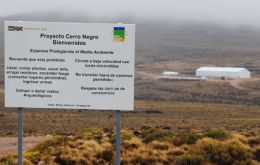
Rival Canadian gold mining companies Goldcorp and Eldorado have locked horns in a fight to buy up Andean Resources Ltd.
-
Wednesday, September 1st 2010 - 06:48 UTC
Argentine to increase budget defence 50%, recovering losses of Falklands war
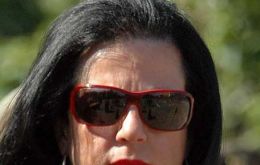
Defence minister Nilda Garré said the Argentine government would increase the defence budget in coming years from 0.9% to 1.5% of GDP to help overcome decades of divestment following the defeat in the (1982) Falklands/Malvinas war.
-
Wednesday, September 1st 2010 - 02:44 UTC
UK and US media blast the Kirchners for attempting “to lock-hold the press”

British daily Financial Times ran an op-ed Tuesday morning blasting Argentina’s presidential couple for their attempt to “secure a lock-hold on Argentina’s press,” and accusing them of mirroring the “black arts” tactics of the Mexican Institutional Revolutionary party.
-
Thursday, August 26th 2010 - 05:05 UTC
Mrs. Kirchner confrontation with Clarin and La Nacion scares investors
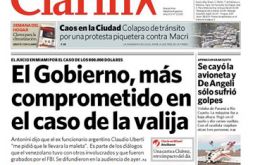
Argentine President Cristina Fernandez de Kirchner’s growing confrontation with the country’s largest newspaper is exacerbating the biggest tumble in its dollar bonds in two months and prompting JPMorgan Chase & Co. to recommend investors cut holdings.
-
Thursday, August 26th 2010 - 05:02 UTC
US closely following Argentine debate on freedom of the press
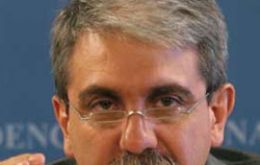
United States Department of State Deputy Spokesman Mark Toner said President Barack Obama's administration is “closely” watching the debate on press freedom in Argentina.
-
Thursday, August 26th 2010 - 04:59 UTC
Argentine government promises free public access to internet
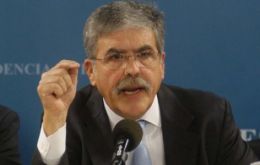
The Argentine government has said it is working to create areas of free public access to the internet across the country through wireless networks.
-
Wednesday, August 25th 2010 - 04:07 UTC
Argentine government accuses Clarín and La Nación of conspiring with military regimes
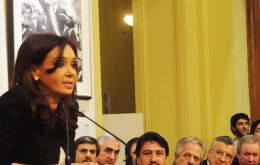
The Argentine government moved Tuesday to take over the country’s only newsprint maker, alleging two leading newspapers illegally conspired with military dictators to control the company three decades ago and then used it to drive competing media out of business.
-
Monday, August 23rd 2010 - 04:47 UTC
Kirchner couple actions plan to control Clarin and La Nacion newsprint mill

Argentina’s two main newspapers, Clarin and La Nacion claim the government of President Cristina Kirchner has a plan to eliminate their stakes at the country’s largest newsprint mill.
-
Sunday, August 22nd 2010 - 04:28 UTC
Shell defies in court Argentine government ban on fuel increases

Royal Dutch Shell which refines about 15% of Argentina’s fuel is waging a court battle against a government ban that prevents fuel producers from increasing prices. Shell’s federal court complaint was filed last week following a government order on August 18 mandating oil companies to lower fuel prices to a pre-August 1 level.
-
Sunday, August 22nd 2010 - 03:05 UTC
The Economist on Argentina's economy: happy-go-lucky Cristina
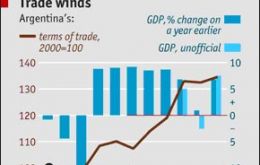
Earlier this year, Cristina Fernández de Kirchner, Argentina’s president, proffered some advice to European governments facing recession and market panic. Its essence was “stuff the IMF and carry on spending.” It is what she and her predecessor and husband, Néstor Kirchner, have practiced since 2003. Argentina is one of only a handful of countries that refuse all dealings with the IMF. Almost a decade after it defaulted on $90 billion of debt when its economy collapsed, it still has few financial ties with the world and very little bank credit. Yet contrary to repeated forecasts of doom from orthodox economists, the economy is roaring.
